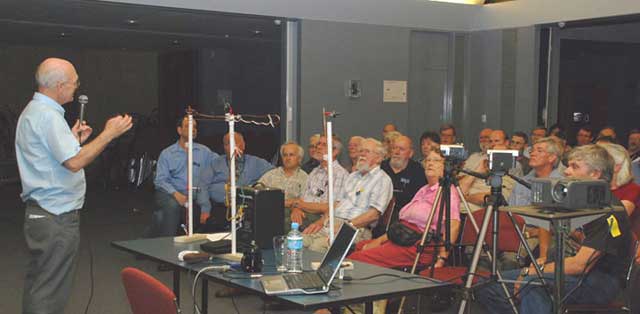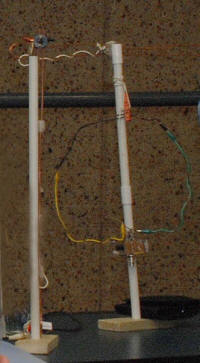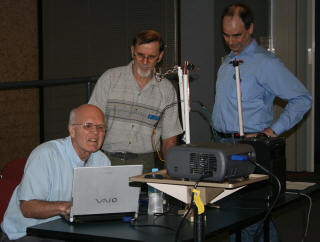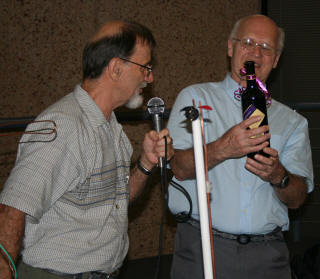REPORT
Special AHARS Lecture Presentation
by
Professor Mike Underhill, G3LHZ
"Small
Antennas"
 |
INDEX |
|
|
|
|
A Special AHARS Lecture
Presentation Titled: All sorts of small antennas – they are better than you think – Heuristics shows why!
Monday 4th
February 2008
During his brief visit to Adelaide Mike has graciously agreed to present AHARS club members and guests with an entertaining and informative talk on the controversial subject of the real-world practical performance of electrically small HF antennas. Examples covered will include the tuned transmitting loop, the novel Hairpin, the Tuned Folded Dipole, and the “Double Dustbin” antenna. The enlightening and practical orientated presentation will be supported by a miniVNA live demo and will include plenty of Q&A time. Brief Bio for Prof Mike Underhill, G3LHZThe formal (boring) stuff:Chairman and Research Director, Toric Ltd, UK and Principal, Underhill Research (Scientific Research Services)Mike’s long industry career was mostly with Philips, where his major roles included Director of the Systems Division at Philips Research Laboratories, Redhill, and Technical Director at MEL, Crawley. For over 20 years, Mike has been an advisor to the Ministry of Defence in a variety of roles, centrally through the Defence Science Advisory Council, but also through QinetiQ (formerly DERA) and DSTL. Mike has also enjoyed a long academic career, and has been associated with the University of Surrey at Guildford UK for nearly 40 years.He has been involved in Defense Electronics (mainly HF Radio) since 1961 and EW and Radar and IR since 1980. His current research interests include low phase noise in oscillators and frequency synthesis, low jitter clocks and clock recovery, HF transmitting loops and associated electromagnetic theory, millimetric and satellite borne HF radar and Ionospheric sounding. He holds about 50 patents in these and related fields and has published about sixty papers. He has been a Fellow of the Royal Academy of Engineering since 1993. The amateur radio (fun) stuff: Mike has written on HF transmitting loop antennas for RSGB and ARRL publications including the specially commissioned article titled “The Truth About Loops” in the International Antenna Collection Handbook which gave an in-depth account of the much maligned small loop. Mike currently has a book on the subject of small loop antennas in preparation for imminent publication in 2008. There has been raging debate and technical comment on the efficacy of small loops in the RSGB’s publication RadCom in recent years, including Pat Hawker’s widely read column. Leigh Turner, VK5KLT. oooOOOooo
|
|
LINKS and DOWNLOADS |
|
Here are some URLs on Mike and his amazing antennas. http://www.g4cdy.co.uk/Loop%20Efficiency%20(Kempton).pdf http://qcwa70.org/truth%20and%20untruth.pdf One of his books: http://direct.bl.uk/bld/PlaceOrder.do?UIN=154388368&ETOC=RN&from=searchengine The DX Sone has links to lots of loop antenna articles http://www.dxzone.com/catalog/Antennas/Loop
Thanks
to Robin, VK5ATT, for providing this. |
| DOWNLOADS: Mike's Lecture Notes Presentation file: All sorts of small antennas better by heuristics .pdf (4.70 MB)
Demonstration
videos: Problems with downloads? Click here. Click
HERE
to see Mike's new paper on fences and rooftops.
(25-02-2008) |
| DVD of the talk: Please contact the webmaster at: [email protected] Final arrangements for
dissemination of the DVD and the Lecture Notes are in
progress. |
|
PHOTOS |
|
|
|
|
|
Part of the large,
appreciative audience. About 80 people attended the presentation. |
|
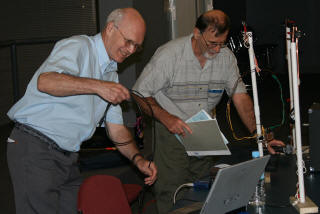 |
|
|
More fun with loops! Mike showing us how to loop microphone cable. (A man of many talents). |
|
|
A close up of Mike's open loop. |
John and Leigh providing moral support for
Mike as he "battles technology" to get his presentation
running. |
|
Mike kept the interest of all up until the end, and even well after that. We enjoyed his affable nature, excellent ability to cover so much in such a short time, and his ability to stimulate our own enthusiasm. (0928-2) |
John presenting "The best of the British"
with the "Best of South Australian wines" as a thank-you. |
|
Photos by David (VK5AMK) and John (VK5EMI) |
|
John Elliott, VK5EMI, President, AHARS. |
|
Updated 14/06/2008 |
